The presence of diarrhea in kittens can be a cause for concern for pet owners, signaling potential health issues that require attention. While occasional mild digestive disturbances may resolve on their own, persistent or severe diarrhea in young cats warrants a closer look into possible underlying conditions.
Understanding the triggers behind your kitten's gastrointestinal distress is key to providing appropriate care and ensuring their well-being. Stay tuned to unravel the mystery behind why your kitten has diarrhea and the crucial signs that indicate when professional veterinary intervention is necessary.
Key Takeaways
- Diarrhea in kittens can stem from various causes like parasites, infections, and dietary changes.
- Immediate veterinary care is crucial for kittens with diarrhea accompanied by vomiting, lethargy, or changes in stool color.
- Home remedies may not be effective; treatment often includes medications for parasites or bacterial infections.
- Prevent kitten diarrhea by gradual diet changes, regular deworming, hygiene upkeep, and feeding high-quality food.
Common Causes of Kitten Diarrhea
Kitten diarrhea can be triggered by various factors, including dietary changes, infections, parasites, and food intolerances. While a change in food is usually not the cause of diarrhea in cats, factors such as cow's milk, parasites, infections like feline distemper, bacterial infections, viral infections, and food intolerance can lead to gastrointestinal issues in kittens.
These triggers can disrupt the delicate balance of their digestive system, resulting in loose or watery stools. It is essential for cat owners to be aware of these potential causes to provide timely intervention and appropriate care for their furry companions.
Recognizing Symptoms of Kitten Diarrhea
Recognizing the symptoms of diarrhea in kittens is crucial for pet owners to promptly identify and address potential health issues in their feline companions. When observing your kitten, look out for the following signs that may indicate diarrhea:
- Soft poop is normal in kittens
- Shapeless, mushy, or liquidy poop indicates diarrhea
- Kittens may have accidents outside the litterbox
- Diarrhea may be visible on paws or around the tail
Monitoring these symptoms can help you determine if your kitten is experiencing diarrhea and needs further attention from a veterinarian. Understanding these signs early on can lead to timely intervention and better outcomes for your furry friend.
Understanding Kitten Poop Colors
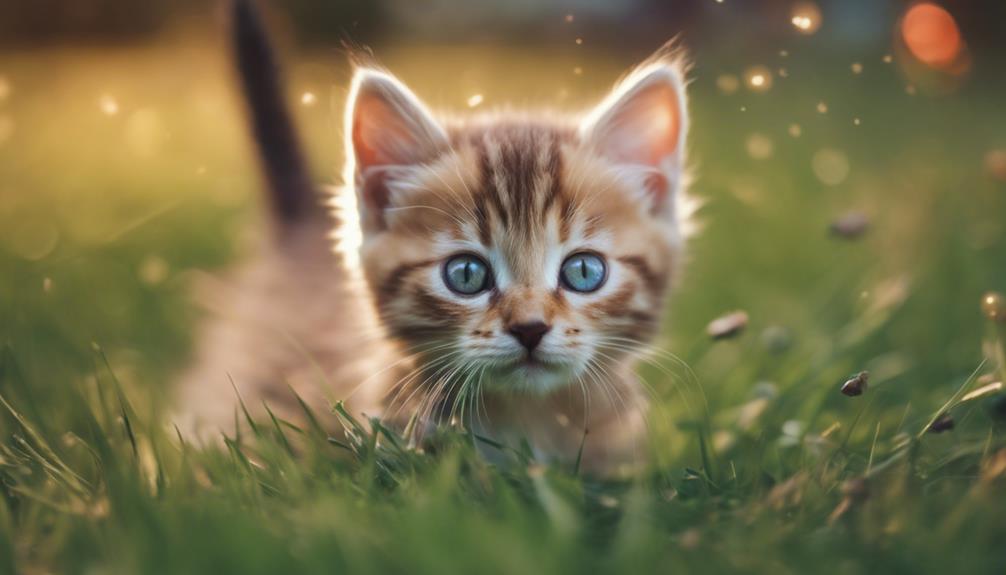
Understanding the color variations of a kitten's stool can provide valuable insights into their digestive health and potential underlying issues. Typically, light to dark brown poop is considered normal in kittens. However, red, black, or green poop is concerning and may indicate underlying problems.
Blood in the stool is a significant red flag that should not be ignored. Changes in stool color can be an indication of various issues affecting your kitten's gastrointestinal tract. Monitoring the color of your kitten's stool along with other symptoms can help you determine when to seek veterinary care promptly.
If you notice abnormal stool colors or consistency, especially when accompanied by other concerning symptoms, it is crucial to consult a veterinarian for a proper diagnosis and treatment.
When Diarrhea Requires Vet Attention
Prompt veterinary attention is necessary when symptoms of diarrhea in kittens are accompanied by persistent vomiting, lethargy, or loss of appetite. These signs could indicate a more serious underlying issue that requires immediate care. If your kitten is experiencing any of these symptoms, it is crucial to seek professional help.
Here are some reasons why vet attention is crucial:
- Early intervention can prevent dehydration
- Proper diagnosis and treatment are essential for recovery
- Veterinarians can rule out serious conditions
- Timely care can prevent the worsening of symptoms
Signs of Dehydration in Kittens
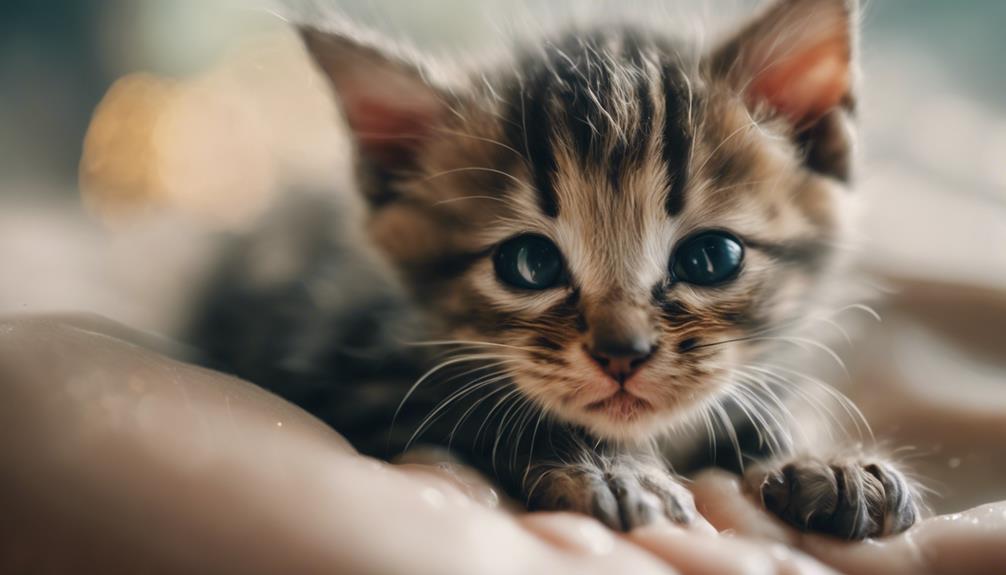
Dehydration in kittens can manifest through subtle but critical signs that require prompt attention to prevent complications. Kittens are more prone to dehydration than adult cats due to their small size and vulnerability. Signs of dehydration in kittens include dry gums, tacky mouth, sunken eyes, lethargy, decreased skin elasticity, and panting.
You may also notice a lack of interest in food or water, reduced urination, and excessive sleeping. Dehydration can be dangerous for kittens and lead to serious health issues if left untreated. If you suspect dehydration in your kitten, it is crucial to seek immediate veterinary care to rehydrate and stabilize your furry companion before complications arise.
Diagnosing Kitten Diarrhea
Upon observing a kitten with diarrhea, a veterinarian may undertake a series of diagnostic measures to identify the underlying cause and provide appropriate treatment. The diagnostic process may involve:
- Physical examination
- Fecal analysis to check for parasites or infections
- Blood tests to assess overall health and detect any underlying issues
- Additional tests such as ultrasound or x-rays to evaluate the gastrointestinal tract
These diagnostic steps are crucial in determining the specific cause of diarrhea in kittens, guiding the vet towards an effective treatment plan.
Early and accurate diagnosis is essential for the proper management of kitten diarrhea and the overall health and well-being of the animal.
Importance of Veterinary Care
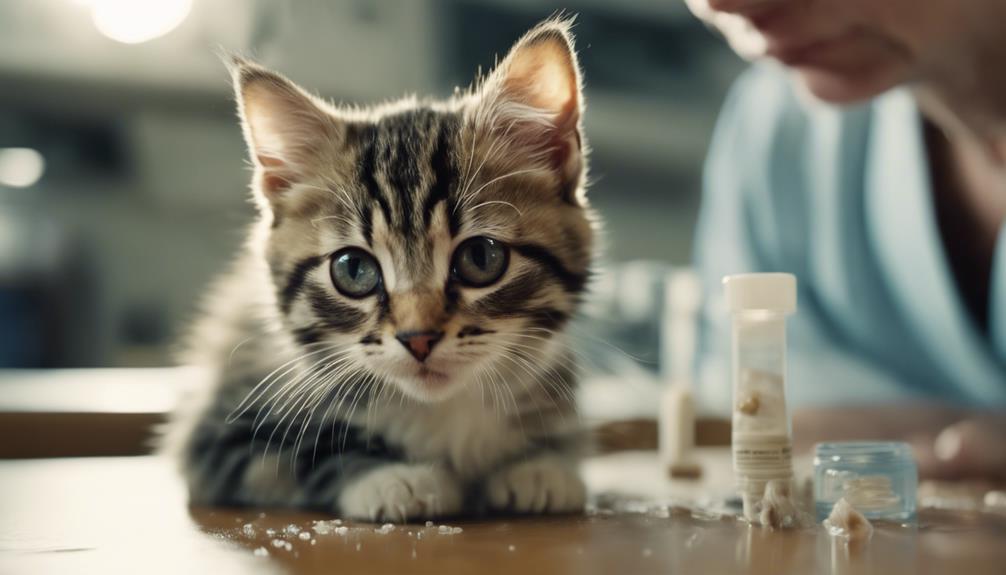
Seeking veterinary care promptly is crucial in managing and treating kitten diarrhea effectively to ensure the health and well-being of the young feline. Veterinarians play a vital role in diagnosing the underlying cause of diarrhea in kittens, which can range from infections to dietary issues.
They have the expertise to conduct thorough physical examinations, recommend necessary diagnostic tests, and provide appropriate treatment. Early intervention by a vet can prevent complications associated with diarrhea, such as dehydration and weight loss, especially in young or senior kittens who are more vulnerable to health issues.
Regular check-ups and timely veterinary care can also help in maintaining the overall health of your kitten and addressing any underlying conditions promptly.
Treatment Options for Kitten Diarrhea
Effective management of kitten diarrhea involves implementing appropriate treatment options to address the underlying causes and alleviate symptoms in a timely manner.
Treatment options for kitten diarrhea may include:
- Medications: Depending on the cause of diarrhea, medications such as anti-parasitics or antibiotics might be prescribed by a veterinarian.
- Fluid Therapy: In cases of dehydration, fluid therapy may be necessary to rehydrate the kitten and restore electrolyte balance.
- Dietary Changes: Transitioning the kitten to a bland diet like boiled chicken and rice can help soothe the digestive system.
- Monitoring: Regular monitoring of the kitten's condition and follow-up appointments with the vet are essential to ensure that treatment is effective and the kitten is recovering well.
Using Probiotics for Digestive Health
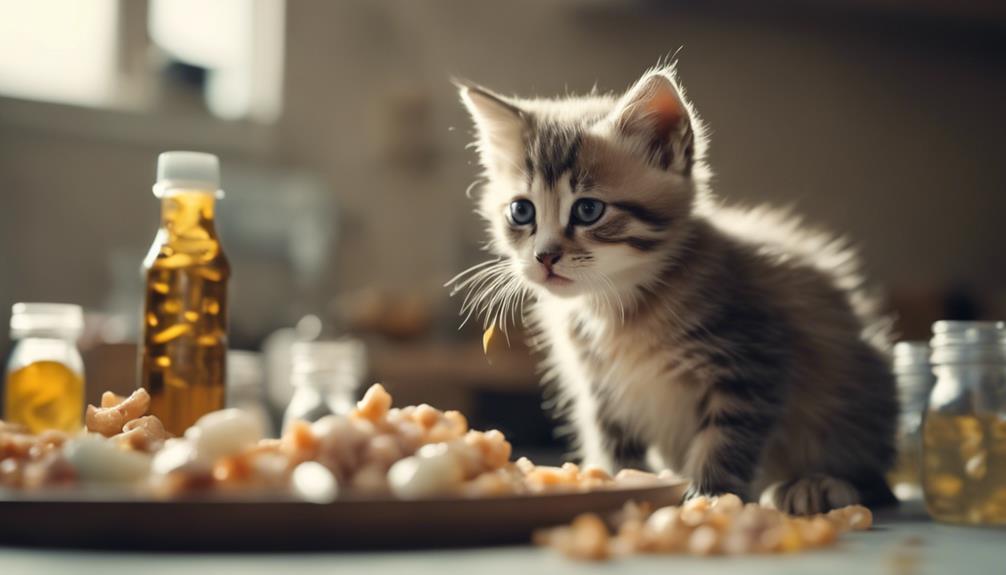
Considering the importance of maintaining a healthy digestive system in kittens experiencing diarrhea, incorporating probiotics can play a significant role in supporting their gastrointestinal health. Probiotics are beneficial bacteria that can help restore the natural balance of the gut flora, aiding in digestion and reducing the severity of diarrhea.
By introducing probiotics into the kitten's diet, it can promote the growth of good bacteria in the intestines, potentially alleviating digestive issues. Probiotics can also enhance the immune system and increase resistance to harmful pathogens, which is crucial for kittens with diarrhea.
When selecting a probiotic supplement for kittens, it is essential to choose a product specifically formulated for feline use and consult with a veterinarian to determine the most suitable option for your kitten's specific needs.
Preventing Diarrhea in Kittens
Maintaining proper hygiene practices and implementing gradual diet changes are key steps in preventing diarrhea in kittens. To ensure your kitten's digestive health, consider the following preventive measures:
- Regular deworming: Prevents parasitic infections that can lead to diarrhea.
- Proper hygiene: Clean your kitten's litter box regularly to reduce the risk of bacterial infections.
- High-quality kitten food: Choose a balanced diet specifically formulated for kittens to support their digestive system.
- Avoiding toxic plants: Keep toxic plants out of reach to prevent accidental ingestion, which can cause digestive issues.
Home Remedies for Kitten Diarrhea
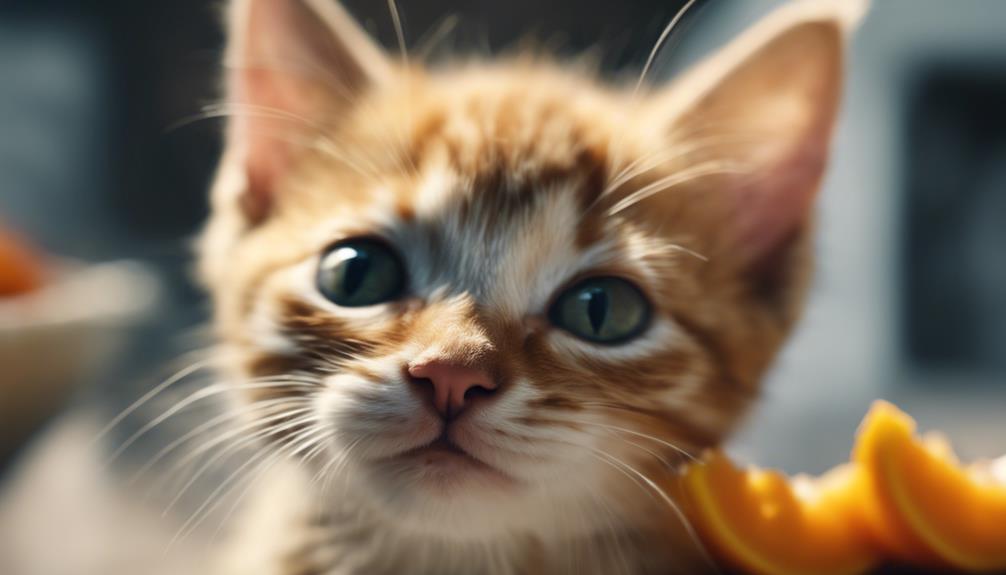
When addressing kitten diarrhea at home, implementing simple remedies can aid in alleviating symptoms and promoting recovery. A combination of fasting, a bland diet, probiotics, adequate water intake, and a gradual return to the regular diet can help manage kitten diarrhea. Here is a table summarizing the home remedies for kitten diarrhea:
| Home Remedies for Kitten Diarrhea |
|---|
| Fasting for 12-24 hours |
| Bland diet (boiled chicken and rice) |
| Probiotics |
| Plenty of fresh water |
| Gradual reintroduction of regular diet |
Dietary Recommendations for Kittens
To ensure optimal health and well-being for kittens, appropriate dietary recommendations play a crucial role in managing their overall digestive health and preventing issues like diarrhea.
When it comes to feeding kittens, consider the following recommendations:
- High-Quality Kitten Food: Opt for well-balanced kitten-specific formulas to meet their nutritional needs.
- Proper Hydration: Ensure kittens have access to fresh water at all times to prevent dehydration.
- Avoiding Toxic Plants: Keep toxic plants out of reach to prevent accidental ingestion by curious kittens.
- Gradual Diet Changes: Introduce new foods slowly to prevent digestive upsets and diarrhea in kittens.
Hygiene Practices to Prevent Diarrhea
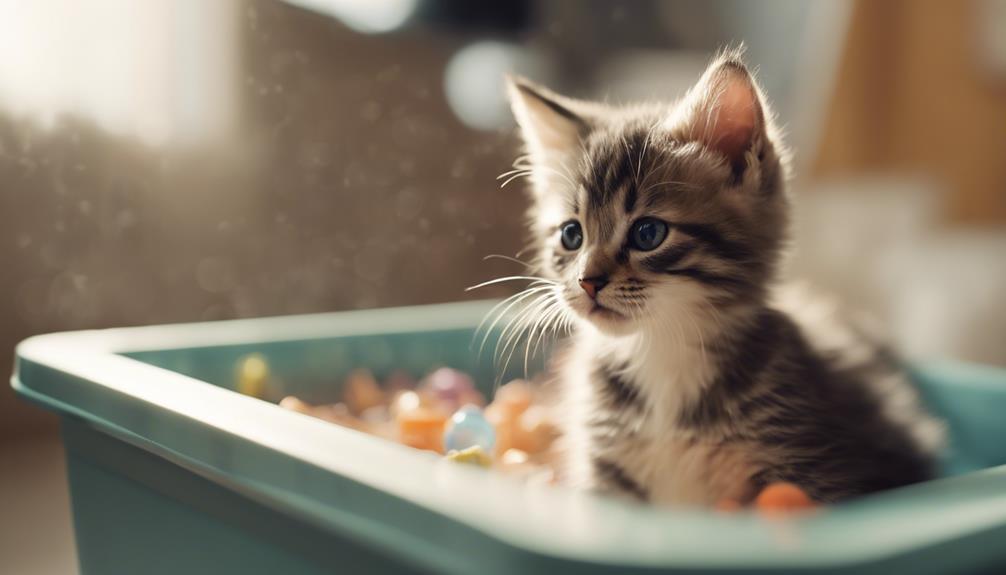
Effective hygiene practices are essential in preventing diarrhea in kittens. Maintaining a clean litter box is crucial to prevent the spread of parasites and harmful bacteria. It is recommended to scoop the litter box daily and completely change the litter at least once a week.
Washing your hands thoroughly after handling your kitten or cleaning the litter box can help prevent the transmission of any potential pathogens. Additionally, keeping your kitten's living area clean and sanitized can minimize their exposure to harmful germs.
Ensuring that your kitten's food and water bowls are washed regularly with hot, soapy water can also contribute to good hygiene practices that aid in preventing diarrhea episodes.
Importance of Regular Vet Check-ups
Regular vet check-ups are crucial for maintaining the health and well-being of kittens. These routine visits help ensure early detection of potential health issues and provide necessary preventive care. Here are four key reasons why regular vet check-ups are essential:
- Vaccinations: Regular vaccinations protect kittens from serious diseases.
- Parasite Prevention: Routine check-ups help in the early detection and prevention of parasites.
- Nutritional Guidance: Vets can offer advice on the best diet for your kitten's specific needs.
- Overall Health Monitoring: Regular exams allow the vet to monitor your kitten's growth, development, and overall health status.
Frequently Asked Questions
Can Stress or Anxiety Cause Diarrhea in Kittens?
Stress or anxiety can indeed lead to diarrhea in kittens. These emotional factors can disrupt their digestive system, causing bowel irregularities. If your kitten is experiencing diarrhea due to stress, consult with a veterinarian to address the underlying issues promptly.
Are There Any Specific Breeds of Kittens That Are More Prone to Diarrhea?
Certain breeds like Siamese, Burmese, and Maine Coons may be more prone to diarrhea due to genetic predispositions. However, any kitten can develop diarrhea due to various factors. Consult a veterinarian for proper diagnosis and treatment.
Can Environmental Factors, Such as Temperature or Humidity, Contribute to Kitten Diarrhea?
Environmental factors like temperature or humidity can potentially contribute to kitten diarrhea by stressing their immune systems. However, the primary causes are usually related to diet, infections, or parasites. Monitoring and addressing these factors are crucial for kitten health.
Is There a Correlation Between a Kitten's Age and the Likelihood of Developing Diarrhea?
The correlation between a kitten's age and the likelihood of developing diarrhea is significant. Young kittens are more prone to diarrhea due to weaker immune systems and susceptibility to infections, parasites, and dietary changes, necessitating prompt veterinary attention.
Can Over-The-Counter Medications for Humans Be Used to Treat Kitten Diarrhea in Emergencies?
While over-the-counter medications for humans may seem like a quick fix for kitten diarrhea emergencies, it's crucial to consult a vet first. Human medications can be harmful to kittens and may not address the underlying cause effectively.
Should I be concerned about my kitten’s diarrhea during their annual vet visit?
If your kitten has diarrhea during their annual cat vet visit, it’s important to inform the vet. Diarrhea can be a sign of various health issues, so the vet will likely want to address it. It’s better to be safe and have the vet examine your kitten to rule out any potential problems.
Conclusion
In conclusion, understanding the causes, symptoms, and appropriate responses to kitten diarrhea is crucial for responsible pet ownership. Recognizing signs of gastrointestinal distress, knowing when to seek veterinary care, and implementing preventative measures are key in ensuring the well-being of your feline companion.
By staying informed, practicing good hygiene, and seeking professional veterinary assistance when necessary, you can help your kitten maintain optimal health and quality of life.




